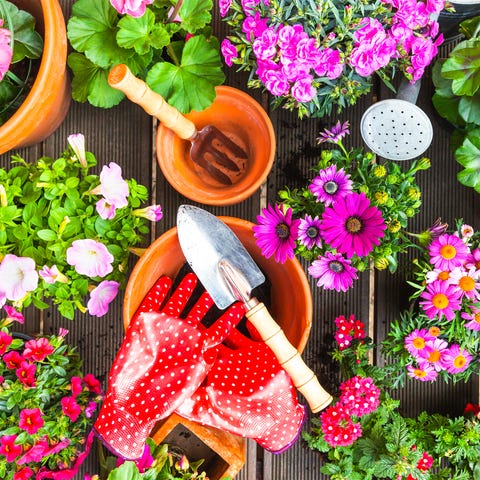It makes sense why you typically focus your spring cleaning efforts on the inside of your house: More often than not, the start of the season is still too cold to spend hours outdoors. But you don’t want to rush to get your backyard ready for your Memorial Day BBQ or worse, completely miss out on spring planting season. That means that as soon as the last frost hits and the temperatures stay above freezing, you should get ahead on your spring yard clean up.
Since tackling your entire house and yard at once can be overwhelming, take things one step at a time by following this checklist. Then cross-check it with our ultimate spring cleaning guide to make sure you create a plan you can handle.
Lawn
Your lawn is the first place you should start. Once the last of the snow is gone, survey your yard for any for any trouble spots and then tackle problems head-on with these tips and tricks:
- If heavy traffic and pet messes have ruined your grass, sprinkle soil over the area with a combination of grass seed and fertilizer. Keep dirt moist until the seeds sprout into grass.
- Remove any debris cluttering your lawn: Pick up any fallen branches or twigs, clean leftover pet messes, and rake leaves when the ground is completely dry. (FYI, raking over wet grass can tear grass from the roots, leaving you with even more bare patches.) Instead of bagging up leaves and twigs, use them as the foundation for a compost pile.
Trees, Shrubs, and Perennials
Give your plants a solid foundation to build upon by clipping away any dead, dying, or diseased branches. While you’re at it, cut back any branches that are encroaching on walkways or high-traffic areas, so they don’t get accidentally broken off during the spring and summer months. Not only will this make your backyard more inviting, but it’ll also allow more sunlight and air to reach the center of trees and shrubs.
Not all plants are created equal, so follow this handy pruning guide to make sure you treat yours right:
- Ornamental Grasses: Tie the tops of the grasses for quick and easy cutting, and then snip as close to the ground as possible.
- Semi-woody Perennials: Cut back butterfly bushes and Russian sage to about 4 inches tall.
- Broad-leaved Evergreens: Prune any injured foliage from evergreens like boxwood or holly firethorn. Wait until early summer to hedge.
- Flowering trees: Before roses and hydrangeas fully bloom, remove dead, damaged, or crowded stems, and shape or cut back as desired.
Garden Beds
Flowers need room to grow, so it’s important that you clear garden beds of fallen leaves, dead foliage, and unruly weeds before spring is in full swing. Not sure when it’s time to get to work? Start raking fallen leaves and digging up dead plants as soon as the soil has thawed and the last frost has passed. Then, overhaul your garden beds by following these tips:
- Dig up perennials, including daylilies and hostas, and divide them into three-stem groupings. Use them to fill in any sparse spots in the garden bed.
- Shovel out last year’s mulch to provide a blank slate for a new layer, which should be added once spring planting is complete.
- Want to add more plant beds this year? Use a tiller to break new ground, or build raised beds to make a bigger statement. Starting in early spring, plant trees, shrubs, and hardy perennial flowers (bleeding heart and geraniums, for example). Wait until the last frost of the season to plant annuals and tender perennials (begonias and calla lillies, to name a few).
Patio and Pathways
Before you really take advantage of your outdoor space, make sure that it’s ready to entertain. Use these tips as your guide to spruce up dirty patio furniture, wooden decking, outdoor patios, or paver walkways:
- Clean Dirty Patio Furniture: If your metal and plastic outdoor furnitureneeds a good clean, mix a generous amount of dish liquid soap with warm water in a bucket. Then spray the furniture down with a hose. Using a nylon scrub brush, wash the chairs with the solution; then rinse thoroughly. Cut the drying time by tipping the furniture on its side in the grass to let the water drain off.
- Remove Mildew on the Deck: Moisture trapped beneath planters and debris can cause mold to grow. To remove mildew stains, mix 2 cups of liquid chlorine bleach and 2 1/2 tablespoons of powdered laundry detergent into 1 1/2 quarts of warm water. Saturate the area with the solution and allow it to set for 10 to 15 minutes. Scrub the stains with a stiff broom and rinse thoroughly.
- Refresh Wicker and Rattan Furniture: Dip a soft cloth in mild soap and water, and wipe off the furniture surface. Remove any dirt in the grooves with a toothbrush. Let the furniture dry completely in the sun before using.
- Get Rid of Mud and Grime: After clearing the patio, sweep any debris and hose down until clean. Create a mixture of one cup baking soda with two cups distilled white vinegar, and spread over the concrete patio with a mop. Let sit for 30 minutes, then use a nylon-bristled scrub brush to scrub clean.



